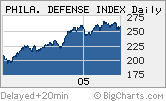 |
| Military might: Shares of defense contractors have surged during the past year in spite of the broader market's woes. |
|
|
|
|
|
|
|
| * based on2005 estimates and prices as of 4/25/05 | | Source: Thomson/Baseline |
|
|
NEW YORK (CNN/Money) – There have been few places for investors to hide in what's been a lackluster market lately.
But one sector has held up quite well. And it's helping to prove that one of the most overused cliches of professional sports is actually applicable to investing: You can't win without a good defense.
Shares of the ten defense and aerospace companies in the S&P 500 are up an average of 5 percent this year while the broader market has sunk 4 percent, according to Thomson/Baseline. Boeing (Research), up 15 percent year to date, is the second best performing stock in the Dow this year. Meanwhile Goodrich (Research) and Rockwell Collins (Research) have both surged nearly 20 percent.
What's more, shares of the twenty U.S.-based defense companies with a market value of at least $1 billion are up 30 percent, on average, during the past 12 months compared to just a 2 percent gain in the S&P 500.
Earnings march higher
The reason for this solid performance is fairly simple. With ongoing military operations in Iraq and Afghanistan, not to mention an increased focus on homeland security, spending on new defense equipment is a top priority right now. And that's probably not going to change anytime soon.
"In spite of clear budgetary constraints, there hasn't been any attempt to reign in defense spending," said Wendell Perkins, manager of the JohnsonFamily Large Cap Value fund, which owns shares of defense firms Lockheed Martin, Northrop Grumman and United Technologies.
And this should be reflected in the strong first quarter numbers that most defense firms are expected to post this week. Lockheed Martin (Research), for example, reported on Tuesday morning that earnings increased a better than expected 27 percent from a year ago. It also raised its 2005 guidance.
Meanwhile, L-3 Communications (Research), a spin-off of Lockheed that makes intelligence and surveillance systems, reported that its first quarter profits surged 42 percent from the same period last year. L-3 boosted its 2005 forecast as well.
Later this week, Boeing, Goodrich, Northrop Grumman (Research), Raytheon (Research), and Rockwell Collins are all on tap to release their first quarter results. All of these companies, with the exception of Boeing, are expected to post year-over-year earnings gains in excess of 30 percent.
But is there more room to run for the group? Shares, while not necessarily bargains, aren't that expensive.
The ten defense firms in the S&P 500 trade at a reasonable valuation of 18.6 times earnings estimates for 2005. That's about a 12 percent premium to the market's multiple but the defense companies are expected to report an average increase of 19 percent in profits this year compared to just a 5 percent gain for the S&P 500.
Set your sights on defense technology
Still, it pays to do your homework since some companies are more attractive than others.
"While the sector's had a great run, there are still a number of companies that are fundamentally undervalued. But as the industry continues to prosper, investors need to be extremely selective," said Dan Ahrens, manager of the Vice Fund (Research), a mutual fund that specializes in defense and other so-called sin stocks.
Ahrens said some of his top defense holdings are L-3, Lockheed Martin and Dow component United Technologies (Research), which reported a better than expected first-quarter profit last week.
He also likes two smaller firms, United Defense Industries (Research), the combat vehicle manufacturer that is in the process of being acquired by British defense company BAE Systems, and Engineered Support Systems (Research), which makes military electronics systems.
But Ahrens said L-3 and Engineered Support Systems are probably his two favorites in the group because they have more of a tech focus. He thinks there is more growth potential for their types of companies than those that depend more on building planes, ships, and weapons.
"This is not to say that nuts and bolts contractors are at a disadvantage," Ahrens said. "But if you look at long-term trends, there will need to be more refurbishing of a lot of equipment so I've been increasingly looking towards tech-slanted defense contractors."
Kent Mergler, president of Northstar Capital Management, an investment firm based in Palm Beach Gardens, Florida, specializing in growth stocks, also likes L-3. But that's the only defense company he owns. He said that he's attracted more to the company's steady growth rates and worries that other defense firms could be subject to earnings volatility.
"We own L-3 because it's a good solid stock as opposed to being part of an industry theme play," Mergler said. "The defense industry has the wind at its back now but most companies don't have the earnings consistency we're looking for."
Mergler added that he's not concerned about a criminal probe of L-3 over faulty electronic parts for military radios, saying that it affects a small unit of the company. The Wall Street Journal reported Tuesday that the investigation may widen, however.
All in all, Perkins said he wouldn't necessarily be looking to chase defense stocks at these levels. But he adds that now isn't a time to sell either since there aren't many other industries out there expected to post such strong levels of growth.
"The stocks are not cheap anymore but there aren't many alternatives out there. Good opportunities are hard to find in this market," Perkins said.
For a look at more aerospace and defense stocks, click here.
For a look at all of CNN/Money's earnings coverage, click here.

|